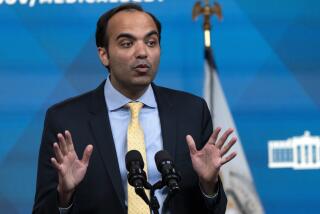Regulators Take Steps to Address Concerns About Broker Conflicts of Interest
- Share via
Federal regulators took a series of steps Tuesday to address rising doubt that brokers and other financial advisers consistently act in their clients’ best interests.
* In Washington, the Securities and Exchange Commission adopted new rules requiring disclosure to customers of how much a brokerage is paid to steer a stock order to a particular broker or dealer for execution.
The practice, known as payment for order flow, is controversial. Critics describe such payments as kickbacks from exchange floor specialists and others that prevent customers from getting the best possible price for their purchase or sale of securities.
The SEC rule does not ban or restrict these payments; it merely requires firms to disclose a range of cash payments on a customer’s annual statement, trade confirmation slips or new-account record. The rule will go into effect in April.
The idea is to let the customer see the otherwise hidden incentives that firms have to route their orders to a particular market and let him or her shop around for the best deal.
“It casts a light on a practice that a typical investor knows nothing about,” SEC Chairman Arthur Levitt Jr. said.
Commissioner Steven M.H. Wallman, while saying he recognizes the potential for conflicts posed by the payments, pointed out that the payments may have spurred healthy competition among exchanges.
Stocks listed on the New York Stock Exchange, for example, can be traded on regional exchanges, in the private “third market” or among firms. At least 15% of orders in listed stocks are routed according to payment for order flow arrangements, according to a recent Harvard Law Review article on the topic.
* The SEC also proposed a rule that would restrict Nasdaq dealers from trading ahead of their customers’ limit orders. A limit order refers to a customer’s desire to sell stock at a minimum price or buy stock for no more than a maximum price.
Trading ahead of a limit order can give a dealer an unfair advantage in knowing the direction of a stock’s price. Many market experts say the practice puts the dealer’s interests--and profits--ahead of a customer’s.
The SEC’s proposal, which will be open to comment for 60 days, would go further than a similar rule proposed last week by the National Assn. of Securities Dealers. The NASD proposal was more limited in that it would provide protection for small limit orders--those for fewer than 1,000 shares--but less protection for larger orders.
* In New York, Comptroller of the Currency Eugene Ludwig said bank employees who sell mutual funds will have to pass the same tests required for stockbrokers.
Banks got into the mutual fund business just a few years ago, and customers have complained about some bankers’ sales tactics.
Now thousands of bank employees will have to take eight-hour securities exams administered by the NASD.
Many salespeople at large banks have already passed the exams because they work for mutual fund marketing subsidiaries whose employees must be certified by the NASD. But bank employees at small and medium-sized financial institutions, which typically do not set up separate investment subsidiaries, have not taken the tests. These banks are regulated by Ludwig’s office.
More to Read
Inside the business of entertainment
The Wide Shot brings you news, analysis and insights on everything from streaming wars to production — and what it all means for the future.
You may occasionally receive promotional content from the Los Angeles Times.










